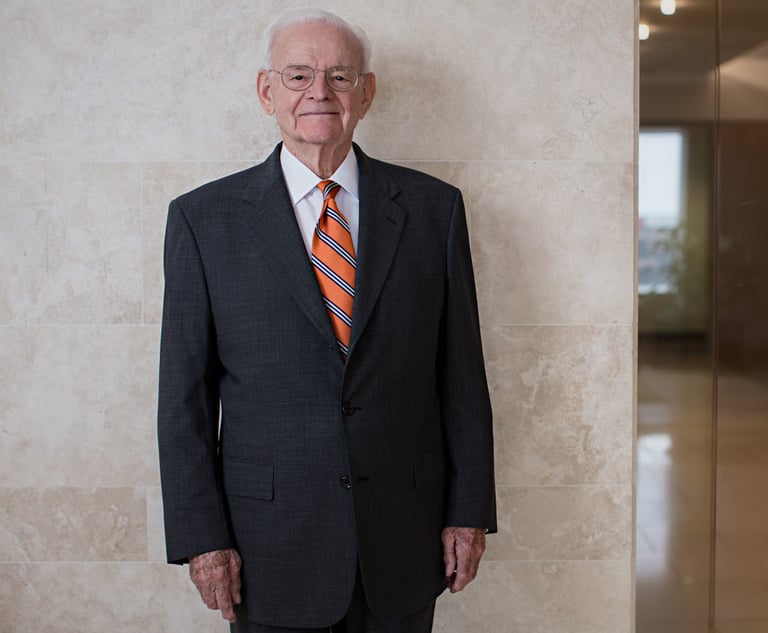 La Tasha Williams, a candidate for Dauphin County Court of Common Pleas. Courtesy photo.
La Tasha Williams, a candidate for Dauphin County Court of Common Pleas. Courtesy photo. General Election: La Tasha C. Williams Runs for Dauphin County Court of Common Pleas
"I would consistently apply the law as written while keeping in mind legislative intent and the reality that our federal and state framers authored constitutions during a specific period of our history."
October 17, 2023 at 05:15 PM
4 minute read
Candidate: La Tasha C. Williams
Court: Dauphin County Court of Common Pleas
Party: Democrat
The following has been edited lightly for length and style.
The Legal Intelligencer: How would you describe your judicial philosophy?
La Tasha C. Williams: My judicial philosophy is a combination of core values I embody such as fairness, truth and "doing unto others as I would have them do unto me." With this in mind, I would consistently apply the law as written while keeping in mind legislative intent and the reality that our federal and state framers authored constitutions during a specific period of our history.
The Legal: What makes you the best candidate for the role?
Williams: My qualifications make me the better candidate to serve as a Common Pleas judge for Dauphin County. Having served as an advocate for the wrongly convicted, judicial law clerk, defense attorney and prosecutor, I have served on all sides within our criminal court division and am seasoned in trial and post-trial litigation. My close work with families as an early intervention coordinator, high school teacher and attorney handling dependency and juvenile delinquency cases (as a defense attorney and prosecutor) equip me with the skill set necessary to navigate challenging cases within our family law division. I have successfully navigated the complexities of separation of powers with my years of service as a legislative research analyst for our state legislature, trial and appellate law clerk, and current service as a township commissioner.
My lived experience as a Black woman who has lived in diverse communities—from affluent to middle-class to economically disadvantaged—qualify me to apply our laws to the facts of cases with a keen ability to relate to all litigants irrespective of their ZIP code, whom they love or worship, or the color of their skin. I am unique in that my legal career includes 22 years of diverse professional experiences and I have a strong pulse in the community through my outreach and volunteerism with several local nonprofit organizations.
The Legal: What is the greatest threat to the practice of law or problem the profession faces?
Williams: Simulated human intelligence, also known as artificial intelligence, is one of the greatest threats to the practice of law to the extent that a human's experience and perception is impossible to simulate when applying a law to the unique facts and circumstances of a case.
The Legal: What does your party membership say about you and your legal outlook?
Williams: My status as a registered Democrat is a reflection of my commitment to democracy and democratic ideals. To this end, my personal beliefs would never interfere with me rendering a decision in accordance with the law.
The Legal: Do you think courts in Pennsylvania have a perception problem when it comes to appearing partisan or polarized? If so, what would you do to combat this?
Williams: Voters have elected a total of three Democrats to the Dauphin County Court of Common Pleas in its 238-year history. Therefore, the perception of partisanship is an actual reality. Further, voters have elected a total of two women, albeit a third woman who was also a Democrat served by appointment. I would commit to fostering an environment of inclusion so that the staff within the courthouse is reflective of the community I serve.
The Legal: Several CLEs and bench-bar panels have recently addressed the growing phenomenon of distrust in the courts. In your view, how has distrust in the judiciary created challenges for the bench, and how should judges respond?
Williams: Distrust in the judiciary can discourage attorneys who truly believe in our system of justice. When an attorney is discouraged, performance is lacking, ineffective assistance of counsel is rendered, which in turn harms the client. As a result, the court becomes faced with a backlog of cases where litigants seek redress. Judges should respond by giving parties what they deserve—a fair opportunity to be heard and a decision that is supported by law.
The Legal: What factors matter in deciding when recusal is necessary, and would you recuse yourself if a campaign contributor were involved in litigation as a party or attorney before you?
Williams: The mere appearance of an impropriety demands recusal. I would recuse myself if a campaign contributor appeared before me.
The Legal: Who are your role models and mentors?
Williams: The ancestors are my role models as their struggles and triumphs motivate me to show up for our community every day.
NOT FOR REPRINT
© 2025 ALM Global, LLC, All Rights Reserved. Request academic re-use from www.copyright.com. All other uses, submit a request to [email protected]. For more information visit Asset & Logo Licensing.
You Might Like
View All
Superior Court Directs Western Pa. Judge to Recuse From Case Over Business Ties to Defendant
3 minute read
Saxton & Stump Lands Newly Retired Ex-Chief Judge From Middle District of Pa.
3 minute read
'Discordant Dots': Why Phila. Zantac Judge Rejected Bid for His Recusal
3 minute read
Judge Louis C. Bechtle: An American Jurist Who Relied on Common Sense, Sound Judgment and Fairness
5 minute readTrending Stories
- 1Uber Files RICO Suit Against Plaintiff-Side Firms Alleging Fraudulent Injury Claims
- 2The Law Firm Disrupted: Scrutinizing the Elephant More Than the Mouse
- 3Inherent Diminished Value Damages Unavailable to 3rd-Party Claimants, Court Says
- 4Pa. Defense Firm Sued by Client Over Ex-Eagles Player's $43.5M Med Mal Win
- 5Losses Mount at Morris Manning, but Departing Ex-Chair Stays Bullish About His Old Firm's Future
Who Got The Work
J. Brugh Lower of Gibbons has entered an appearance for industrial equipment supplier Devco Corporation in a pending trademark infringement lawsuit. The suit, accusing the defendant of selling knock-off Graco products, was filed Dec. 18 in New Jersey District Court by Rivkin Radler on behalf of Graco Inc. and Graco Minnesota. The case, assigned to U.S. District Judge Zahid N. Quraishi, is 3:24-cv-11294, Graco Inc. et al v. Devco Corporation.
Who Got The Work
Rebecca Maller-Stein and Kent A. Yalowitz of Arnold & Porter Kaye Scholer have entered their appearances for Hanaco Venture Capital and its executives, Lior Prosor and David Frankel, in a pending securities lawsuit. The action, filed on Dec. 24 in New York Southern District Court by Zell, Aron & Co. on behalf of Goldeneye Advisors, accuses the defendants of negligently and fraudulently managing the plaintiff's $1 million investment. The case, assigned to U.S. District Judge Vernon S. Broderick, is 1:24-cv-09918, Goldeneye Advisors, LLC v. Hanaco Venture Capital, Ltd. et al.
Who Got The Work
Attorneys from A&O Shearman has stepped in as defense counsel for Toronto-Dominion Bank and other defendants in a pending securities class action. The suit, filed Dec. 11 in New York Southern District Court by Bleichmar Fonti & Auld, accuses the defendants of concealing the bank's 'pervasive' deficiencies in regards to its compliance with the Bank Secrecy Act and the quality of its anti-money laundering controls. The case, assigned to U.S. District Judge Arun Subramanian, is 1:24-cv-09445, Gonzalez v. The Toronto-Dominion Bank et al.
Who Got The Work
Crown Castle International, a Pennsylvania company providing shared communications infrastructure, has turned to Luke D. Wolf of Gordon Rees Scully Mansukhani to fend off a pending breach-of-contract lawsuit. The court action, filed Nov. 25 in Michigan Eastern District Court by Hooper Hathaway PC on behalf of The Town Residences LLC, accuses Crown Castle of failing to transfer approximately $30,000 in utility payments from T-Mobile in breach of a roof-top lease and assignment agreement. The case, assigned to U.S. District Judge Susan K. Declercq, is 2:24-cv-13131, The Town Residences LLC v. T-Mobile US, Inc. et al.
Who Got The Work
Wilfred P. Coronato and Daniel M. Schwartz of McCarter & English have stepped in as defense counsel to Electrolux Home Products Inc. in a pending product liability lawsuit. The court action, filed Nov. 26 in New York Eastern District Court by Poulos Lopiccolo PC and Nagel Rice LLP on behalf of David Stern, alleges that the defendant's refrigerators’ drawers and shelving repeatedly break and fall apart within months after purchase. The case, assigned to U.S. District Judge Joan M. Azrack, is 2:24-cv-08204, Stern v. Electrolux Home Products, Inc.
Featured Firms
Law Offices of Gary Martin Hays & Associates, P.C.
(470) 294-1674
Law Offices of Mark E. Salomone
(857) 444-6468
Smith & Hassler
(713) 739-1250





